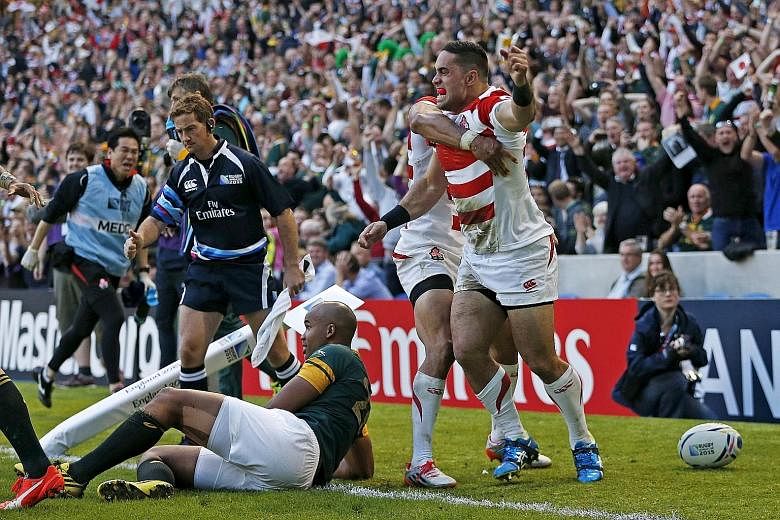The old Japanese man is crying. The players, burly fellows to be avoided in dark alleys who are nicknamed Cherry Blossoms, are weeping. Rugby is in tears. The marvel of The Great Upset is that the very athletes who achieve it can wonder how it was done. Was Japan's defeat of South Africa a dream come true or in fact a dream surpassed? The Great Upset is not always the day you worked for, it is sometimes the day you never thought would come.
At the 2000 Olympics, Rulon Gardner, a farm boy from Wyoming, faces Alexander Karelin in the super-heavyweight wrestling final. Karelin, it is written in David Wallechinsky's The Complete Book of the Olympics, weighed 15 pounds at birth. He wrestles once with a broken rib because it is absurd to "skip a fight because of such a trifle" and by 2000 is 59-0 at the Olympics and world championships. Presumably he snacks on steel.
But Gardner beats him and says: "To be realistic I didn't think I could actually beat him." He is not alone. Before Roberta Vinci played Serena Williams in their US Open semi-final she booked a ticket home. A TV channel went further and advertised the women's final as Williams versus Flavia Penetta. It was presumptuous of them and yet most of us presumed Williams would win. Vinci's Great Upset reminds us we are not as smart as we like to think we are.
I missed rugby's Great Upset because it occurred in the early hours and who stays up for Japan versus South Africa - not a real match but a sporting snack. For such cynicism, I was punished. But the dutiful fan watches sport and not just the stars. He stays awake for even the lopsided encounter and on this night was rewarded with The Great Upset.
"Anything can happen" we like to say of sport, but it is not always true. Sport, mostly, follows a natural order and offers us a somewhat predictable outcome and we do not complain. Tennis had been happily reduced to a four-word vocabulary of Federer, Djokovic, Nadal, Murray. In football, the same teams rise like rich cream to the table's top.
And so The Great Upset, which breaks winning streaks and strips champions of any notions of invincibility, keeps sport honest. It provides uncertainty, it brings drama, it is the tale of the ignored outsider, beaten down day after day, claiming his place in sport. The right to win is not the preserve of only the few.
The Great Upset is a rare balancing of an uneven world. Sport is not just the survival of the fittest but the rule of the richest, with access to the best facilities and the finest science. Yet once in a while the unknown athlete, like Anthony Nesty, thumbs his nose at sporting Darwinism.
At the 1988 Olympics, in the 100m butterfly final, the massive and majestic Matt Biondi led with 10m to go. Then he erred by opting to glide to the finish and lost to Nesty, a 20-year-old in only his second international meet who hailed from Suriname, a nation then with only one 50m pool. Nesty won by 0.01 of a second and later Biondi pondered what might have happened had he grown his fingernails longer.
The Great Upset is as rare as Nadal falling at the French Open. It is often hinted at, it is threatened, then it peters out. The favourite, eventually, finds a solution and his way; the longshot, playing on the edge of brilliance for longer than he can, loses his way.
But then, once in a while, the favourite assists the underdog in his own demise. To the outsider's bravery, consistency and skill is added the champions' errors. Tiger Woods missed putts against Y.E. Yang at the 2009 PGA Championship and Serena made 40 unforced errors against Vinci. And sport shook.
The Great Upset is an education into the patience of the underdog and also, ironically, the resilience of the champion. Every day they are pushed, counted on for courage, expected to win and almost every day they do not fail. It is an unreal pressure because every day, for years, they must fend off The Great Upset. And when it happens we ask what is wrong with them.
The champion, whose ambition is inexhaustible, usually recovers from The Great Upset but the underdog, tired after this stiffening of his sinews, rarely does. Dustin Brown upset Nadal at Wimbledon and was gone next round. Japan has been lauded for days yet now must reproduce their gallantry against Scotland tomorrow.
The Japanese should enjoy The Great Upset for something has already irrevocably changed with them. I know this because in 1983, as a very young man, I watched India, 66-1 outsiders, beat the beautiful, brutal West Indies in the World Cup cricket final.
India did not win another Cup for 28 years, yet after 1983 a nation knew it could. And so Japan may upset another nation to much delight but it will never again be such a surprise. Perhaps once you have beaten Goliath you cannot ever be David again.


